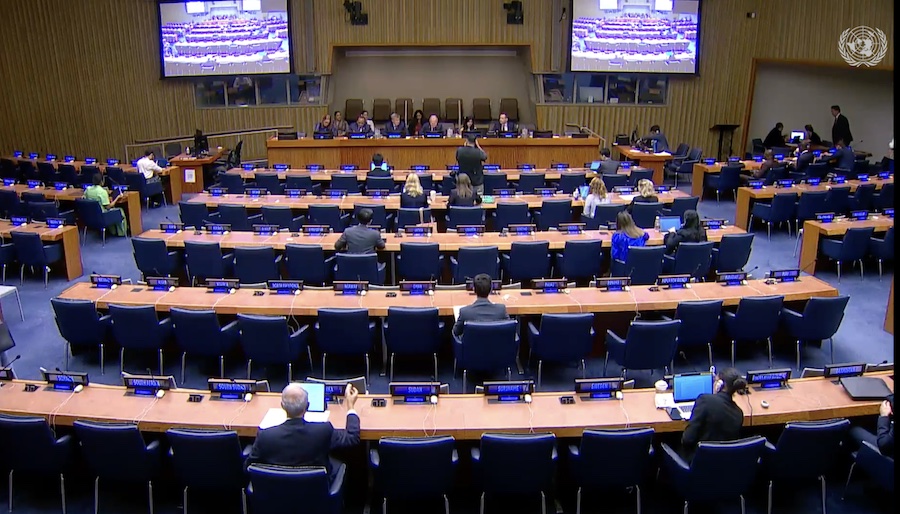FREE FLOW OF INFORMATION
by CPNN
Every year CPNN carries articles about the United Nations High-Level Forum on the Culture of Peace that has been convened annually by the President of the UN General Assembly since 2012. This year it took place at UN headquarters on August 31.

Scene at beginning of Forum, taken from UN video. (Note that in previous years, the room was filled with representatives of civil society and Member States)
A concept note with background about the culture of peace was published this year prior to the forum by the President of the General assembly saying that it would be dedicated to the theme “Promoting Culture of Peace in the Digital Era.”
As was the case in 2022, the United Nations did not publish a general article about the forum. The order of the programme was published in the UN Journal along with links to statements from 22 Member States, but a summary of the event was not published in the UN websites for meetings or press releases.
A three-hour video of the forum is available from the UN media center and a separate video of the presentation by Sri Lanka is available on YouTube.
In this article we have sought excerpts from other articles, including speeches delivered at the forum.
The following description of the event was published in Bangladesh
“Convened by President of the General Assembly Csaba Korosi, the forum’s inaugural session featured addresses from distinguished speakers, including the Under-Secretary General for Policy, Director of UNESCO’s New York Office, and the Head of UN Affairs of ITU.
“Later a panel discussion was held under the theme, “Promoting Culture of Peace in the Digital Era,” which was chaired by Ambassador Alya Ahmed Saif Al-Thani, Permanent Representative of the State of Qatar, and participated by member states, observers and the civil society.
“Apart from Member States, expert speakers including the Secretary General’s Tech Envoy, Rector of the University for Peace and representative of Google presented remarks in the panel discussion.
“Applauding Bangladesh’s leadership in promoting culture of peace, the President of the General Assembly highlighted that sustaining a culture of peace in the digital age entails nurturing an inclusive online space that encourages respect and tolerance.
(continued in right column)
What is the United Nations doing for a culture of peace?
(continued from left column)
“This involves countering online hate speech and discrimination and addressing the risks of misusing new technologies without depriving those who require them,” he said stressing the importance of collective involvement, he underscored that success hinges on robust multilateral cooperation.”
Since there was not other news coverage of the event, one needs to listen to the UN video to learn more.
The Director of UNESCO’s New York Office spoke from minutes 25-30. He did not mention UNESCO’s history with the culture of peace, such as its responsibility for the UN International Year for the Culture of Peace (2000) and the succeeding Culture of Peace Decade, nor the fact that it prepared and submitted the Draft Declaration and Programme of Action for a Culture of Peace eventually adopted by the General Assembly in 1999.
A prominent place was given to Google. The representative of Google, Zoe Darme, was one of the five presenters in the panel discussion, her presentation taking place from minutes 80 to 87 in the video. She also took an active role in the general discussion that followed, being the final speaker of the day. Curiously, a search by the Google Search Engine reveals photos of her at the forum, but no mention of the content of her remarks.
There was much less participation of the civil society this year. Unlike in previous years, the civil society organizations affiliated with the UN Department of Public Information were not allowed to participate. And Ambassador Chowdhury, who had mobilized civil society participation in previous years was not included in the planning. Back in 1999, when he was Ambassdor from Bangladesh, Chowdhury resisted opposition by the EU and United States and chaired the nine-month negotiations that led to the adoption of the above-mentioned Declaration and Programme of Action on a Culture of Peace.
According to a recent article written by Chowdhury, the “cold-shoulder” given to the culture of peace for this forum this year is part of a more general rejection of the culture of peace by the current United Nations administration. Neither of the two general agendas for action – “Our Common Agenda” (OCA), and “New Agenda for Peace” (NAP) – mention “culture of peace” at all.
– – – –
Here are texts of some of the speeches submitted to this year’s Forum that are available on the Internet:
President of the General Assembly
Representative of the European Union
Representative of the United States
Representative of the University for Peace
Submitted speeches from 17 other countries, as well as the International Telecommunication Union, are available online from the UN Journal.